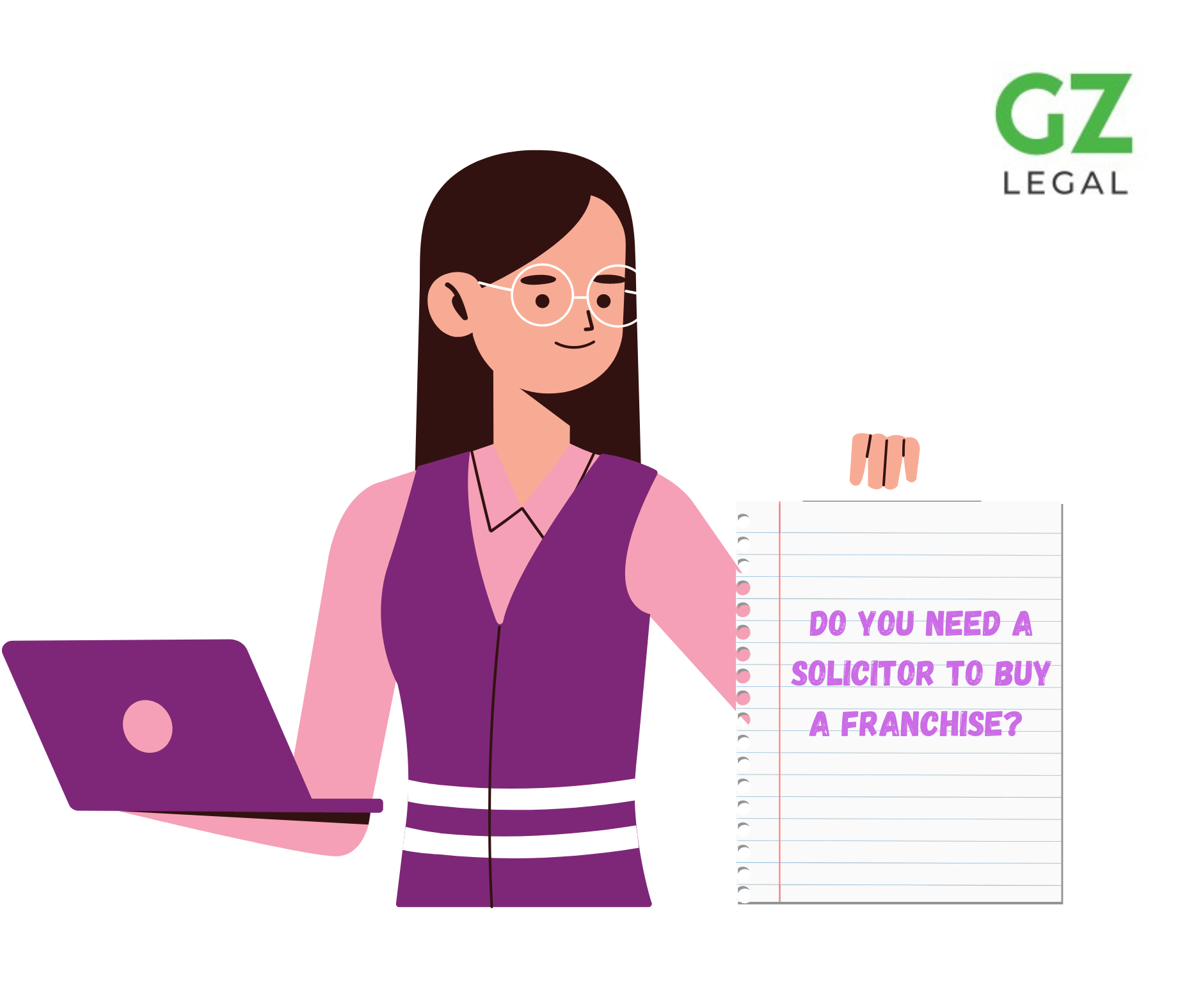Malcolm ZoppiSun Oct 15 2023
Do You Need a Solicitor to Buy a Franchise? Essential Guidance for Prospective Owners
A solicitor can assist with understanding and reviewing a franchise agreement. Keep reading to find out more!
Do You Need a Solicitor to Buy a Franchise? Essential Guidance for Prospective Owners

When considering buying a franchise, many aspiring franchisees find themselves wondering whether they need to engage the services of a solicitor. The process of purchasing a franchise can be quite complex, with several legal aspects requiring attention and, often, expert advice.
In the world of franchising, various aspects need to be navigated with care such as scrutinising the franchise agreement, assessing the value of the franchise, and understanding the obligations towards the franchisor. A solicitor with experience in franchising can not only help you understand these aspects but also provide legal due diligence in ensuring that you make informed decisions.
While it may be possible to buy a franchise without a solicitor, it is often advisable to enlist their expertise to ensure a smoother and legally secure transaction. In brief, the assistance of a solicitor can be invaluable in protecting your interests and guiding you through the process.
Key Takeaways
- A solicitor can assist with understanding and reviewing the franchise agreement
- Legal expertise is helpful in navigating various aspects of buying a franchise
- Enlisting a solicitor can provide valuable assistance in making informed decisions
Understanding Franchising
When you decide to enter the world of franchising, it’s essential to have a clear understanding of the concepts involved. Franchising offers individuals the opportunity to own and manage their own business, while leveraging the brand recognition, training, and support systems of established businesses. You, as a franchisee, will be responsible for operating the business according to the franchisor’s guidelines and requirements.
Franchising offers several benefits, including a proven business model, established customer base, access to established brands, and ongoing support from the franchisor. However, it’s important to understand that you are not solely responsible for creating your own business strategy, as you are required to follow the rules and regulations set by the franchisor.
There are different types of franchise businesses, but the most common are direct franchises and master franchises. In a direct franchise, the franchisor grants the franchisee the rights to operate a single unit of the business. With a master franchise, the franchisee takes on the role as a sub-franchisor, where they hold the rights to a larger territory and are responsible for recruiting and supporting multiple individual franchise units.
In the franchising relationship, it’s essential to understand the roles and responsibilities of both franchisee and franchisor. The franchisee is responsible for the day-to-day operations of their business, managing staff, and maintaining the quality standards set by the franchisor. On the other hand, the franchisor provides the necessary training, resources, and support for the franchisee to succeed in the business. This includes marketing materials, ongoing training programs, and a dedicated support system.
As you contemplate buying a franchise, keep in mind the crucial elements involved in franchising. Understanding the relationship dynamics, responsibilities, and expectations between franchisee, customer base and franchisor, as well as the various types of franchise businesses, will equip you with the knowledge needed to make informed decisions in this industry.
Role of a Solicitor in Buying a Franchise

When considering purchasing a franchise, it is crucial to involve a solicitor who specialises in franchising. A franchise solicitor has the expertise and experience necessary to guide you through the complex legal aspects of this business model. They will not only help protect your interests but also ensure you understand the various legal implications of entering into a franchise agreement.
A specialist franchising solicitor can review and advise on the franchise agreement that you will sign with the franchisor. These agreements often have standard terms and conditions, but a solicitor with experience in franchising can identify any concerning clauses and explain their potential impact on your business. Furthermore, they may advise you on appropriate amendments or the use of a side letter to address specific concerns.
Franchise solicitors, can also assist you in negotiating with the franchisor. They have extensive experience in handling similar negotiations and know how to achieve the best outcome for you. This could include discussing aspects of the business format franchise territory, training provided, and ongoing support from the franchisor.
As a prospective franchisee, you will benefit from a franchising solicitor’s expertise in dealing with various franchise-related disputes. While it is always preferable to avoid conflicts, having a solicitor at your side will help you navigate any issues that could arise with the franchisor in the future. Their knowledge of franchise law and previous case experience can be invaluable in resolving disputes effectively.
In summary, engaging a specialist franchise solicitor when buying a franchise helps ensure that:
- You receive sound legal advice on the franchise agreement and amendments.
- You understand the implications of entering into a franchise relationship.
- You are guided throughout the negotiation process with the franchisor.
- You have access to expert advice on handling potential disputes and conflicts.
Remember, finding a solicitor with a proven track record in franchising law is essential to safeguard your interests and ensure the success of your franchise venture.
Scrutinising Franchise Agreement

Before you buy a franchise, it’s crucial to carefully scrutinise the franchise agreement, as it governs your business relationship with the franchisor. While it’s not a legal requirement to hire a solicitor when buying a franchise, their expertise can be invaluable in helping you understand the terms, conditions, and potential pitfalls of the contract.
In a franchise agreement, you’ll encounter several provisions covering various aspects of your partnership with the franchisor. These provisions detail your rights, responsibilities, and the terms of the relationship. Some common elements include the franchise fee, royalty payments, advertising commitments, and operational standards. It’s essential to thoroughly review these provisions and consider their impact on your own business plan.
As you go through the agreement, make sure you understand the terms used and the implications of each clause. Look out for any terms or conditions that may be overly restrictive or favour the franchisor disproportionately. If you’re uncertain about any part of the contract, don’t hesitate to seek clarification from a solicitor experienced in franchising.
Don’t forget to consider any exit options or buyout provisions in the contract. Circumstances may change over time, and you’ll want to know your options should you decide to leave the franchise. These provisions will detail the terms and conditions under which you can exit the partnership, including any fees, penalties, or obligations you may face.
It’s also crucial to understand how disputes will be handled in the franchise agreement. Most contracts will outline a dispute resolution process, which could involve negotiation, mediation, or arbitration. Knowing the process upfront can save you time, money, and stress down the line.
In conclusion, scrutinising the franchise agreement is a vital step in the process of buying a franchise. While hiring a solicitor is not obligatory, their expertise can help ensure you enter into a fair and balanced partnership with the franchisor. By carefully reviewing the provisions and seeking professional advice, you can set yourself up for success in your franchising journey.
Assessing the Value of a Franchise

When considering buying a franchise, it’s essential to assess its value carefully. This process allows you to make an informed decision on share purchase agreement and ensure that the deal reflects the business’s true worth.
Firstly, evaluate the franchise’s current market position. Look at the overall industry and the specific market niche that the franchise occupies. Analyse how the franchise compares to its competitors and the potential for consistent growth in the coming years. Assessing the market will give you insights into the franchise’s overall value and potential for financial success.
Next, consider the sales and financial performance of the new franchisees. Review the existing franchisees’ performance, paying close attention to revenue, profit margins, and growth trends. Examine the historical sales data, and compare it to other similar franchises in the market. A strong track record of sales is essential for determining a franchise’s overall value.
When it comes to selling a franchise, several factors contribute to the overall deal structure. This includes purchase price, financing options, and any earn-out provisions. When negotiating a deal, make sure to factor in the value of the existing stock, physical assets, and any leases or agreements associated with the franchise. Consult with a solicitor to ensure that the deal is reasonable and protects your interests.
As part of your assessment, speak with existing franchisees to gain insight into their experiences. This will give you a more accurate understanding of the franchise’s value and potential challenges or benefits associated with the business model. Gathering information from current and prospective franchisees and owners will help you make a well-informed decision.
In summary, to assess the value of a franchise, consider market position, sales performance, deal structure, existing franchisees’ perspectives, and the price for the business. By conducting a thorough evaluation, you’ll be confident in your decision and have a clear understanding of the potential return on investment.
Identifying the Location and Territory Limitations

When buying a franchise, it’s crucial to understand the location and territory limitations. This will help you make an informed decision about your investment and avoid potential conflicts with the franchisor.
Firstly, consider the location of the premises. The franchisor may have specific requirements about where a franchise can be located. They might insist on a particular area, type of building, or proximity to other businesses to ensure consistency and brand visibility. You should thoroughly research the location to ensure it meets your needs and aligns with the franchisor’s guidelines.
Territory is another important aspect to consider. In many franchise agreements, there is a defined territory in which you are permitted to operate. This could be a specific town, city, or region, and it’s essential to understand the limitations of your territory. Be familiar with the demographics and market demand within your territory, as well as any competition, to make sure it aligns with your goals and expectations.
Keep in mind that some franchisors may also impose restrictions on the type of premises you can operate from. These may include requirements for square footage, layout, accessibility, and parking facilities. Be sure to discuss and clarify any of these premises requirements with your franchisor, and consult a solicitor where necessary to ensure compliance.
Lastly, be aware of any competition clauses in the franchise agreement. This often means you are not allowed to operate or own a competing business within a specific area or during the term of the agreement. This is important, as it prevents conflicts of interest and protects the overall brand. Make sure you understand the scope of these clauses, as breaching them could result in the termination of your agreement or legal action.
By taking the time to carefully examine and understand the location, territory, premises, and competition limitations, you can make a well-informed decision on whether buying a particular franchise is a suitable investment for you.
Investigating the Franchisor’s Reputation

When considering buying a franchise, it’s essential to investigate the franchisor’s reputation. The reputation and success of the franchisor usually reflect on your own franchise’s performance. By carrying out thorough research, you can determine if the franchisor is the right partner for your business endeavour.
First, check whether the franchisor is a member of the British Franchise Association (BFA). The BFA has strict membership criteria, and being a member indicates that the franchisor is operating ethically and professionally. You can utilise the BFA’s resources and guidance in your research and due diligence process.
Additionally, look for surveys and other independent sources to gain insight into the franchisor’s performance. Independent surveys showcase franchisee satisfaction levels and can highlight any common concerns. Reviewing these surveys will help you better understand the franchisor’s reputation within the industry.
Consider speaking with current and former franchisees of the business. Their firsthand experience can provide valuable feedback on the franchisor’s support, communication, and overall relationship with their franchisees. This information can help you assess whether the franchisor is trustworthy and if their franchisees are generally content with their franchisor partnership.
Lastly, review the franchisor’s trading history and the financial position of its business. Ensure that the franchisor has established reputation and a solid foundation for long-term success and can provide support in case you face any challenges.
By conducting a comprehensive investigation of a franchisor’s reputation, you can make an informed decision about whether to invest in the franchise and confidently move forward with the opportunity.
Understanding Financial Implications

When considering buying a franchise, it is essential to understand the financial implications involved. As a potential franchisee, you will encounter various costs, some of which can be expensive. Having a clear understanding of these expenses will allow you to manage your finances effectively.
One of the primary expenses you will encounter is the initial franchise fee. This fee can range from £5,000 to £250,000, depending on the franchise. It is a one-time payment that grants you the right to use the franchisor’s business model, brand, and support systems.
In addition to the initial franchise fee, you will also be required to pay ongoing royalties. These royalties often come in the form of a percentage of your revenue, which franchisees pay to the franchisor on a regular basis, usually monthly. Royalties serve as compensation for the continued support and services provided by the franchisor throughout the lifetime of your agreement.
Another cost to consider is the transfer fee, which you must pay if you choose to sell your franchise to another party. This fee often covers administrative expenses related to the change of ownership and ensures the new franchisee complies with the franchisor’s guidelines.
It is important to factor in these costs and other additional expenses, such as:
- Stock and supplies
- Equipment and fittings
- Training and support
- Marketing and advertising fees
- Legal and accounting expenses
Thoroughly understanding the financial implications before your purchase, will ensure you have a realistic expectation of the funds required. It may be beneficial to consult with a solicitor experienced in franchising matters who can help you navigate these costs and their significance, ultimately protecting your financial interests as a prospective franchisee.
Exploring Legal Aspects in Franchise Deal

When entering a franchise deal, it’s essential to consider the various legal aspects involved. Engaging a solicitor to assist you in this process can help ensure that you navigate the complexities of the deal while protecting your interests.
Intellectual property is a crucial aspect in a franchise deal. A solicitor can help you understand the rights and obligations of both parties when it comes to trademarks, patents, copyright and other forms of IP. They can also aid in drafting agreements that appropriately allocate these rights while minimising the potential for disputes.
Performing due diligence is key to a successful franchise or asset purchase agreement, as it helps you gauge the viability and profitability of the business. A solicitor can guide you through this process and highlight any potential risks you should be aware of, such as the financial health of the franchisor, operational challenges, and any possible legal liabilities.
Leasing and commercial property matters can often be complex, especially when it comes to site selection, lease negotiation, and property compliance. A solicitor can help you review and negotiate lease terms that are favourable to you, as well as ensure you adhere to all relevant regulations and requirements.
In a franchise deal, compliance with various laws and regulations is critical. Laws relating to consumer protection, data protection, and health & safety may impact your operations. A solicitor can advise you on how to stay compliant with these regulations and avoid legal issues down the line.
Copyright law is another crucial area you need to consider. Ensure that all copyrights associated with the franchise are properly registered and protected to avoid disputes and infringement claims. A solicitor can assist you in handling copyright matters with accuracy and compliance.
A proper understanding of employment law is vital when running a franchise, as you are likely to have staff working for you. Solicitors can help you draft contracts that meet legal requirements, advise on employee benefits, and manage any employment law disputes.
Lastly, franchising typically falls under the umbrella of corporate law. This area deals with business structures, contracts, mergers and acquisitions, and other similar matters. A solicitor can provide valuable guidance in these complex areas, helping you ensure your franchise investment is legally sound.
Change of Ownership and Termination Clauses
When you’re buying a franchise, it’s important to understand and consider the implications of change of ownership and termination clauses in the franchise agreement. These clauses determine how the relationship between you and the franchisor may come to an end or be altered, either through a change in ownership or the termination of the agreement.
In a change of ownership scenario, you may want to sell your franchise or transfer it to a family member or business partner. The franchise agreement should outline the procedures and requirements for such a transfer. Franchisors often have the right to approve any new owner to ensure they meet certain criteria or qualifications. It’s important that you’re aware of these requirements and ensure that the process of transferring ownership is manageable for you.
Termination of the franchise agreement can occur either by mutual consent, by one party, or due to specific triggers such as breach of contract or insolvency. Review the termination clauses carefully to understand the circumstances under which the agreement may be terminated, as well as your rights and obligations in such cases.
Renewal of the franchise agreement is another critical factor to consider. Franchise agreements usually have a set term, after which they may be renewed under certain conditions. It’s essential to understand the renewal process, any conditions you need to meet to renew, and whether the franchise agreement might be subject to renegotiation or changes in terms upon renewal.
As the franchise agreement is heavily weighted in favour of the franchisor, it is vital that you engage a solicitor with expertise in franchise law to review the agreement, paying close attention to change of ownership and termination clauses. The solicitor will ensure your interests are protected and help you navigate the legal intricacies of buying a franchise.
Understanding Different Business Structures
When considering buying a franchise, it’s crucial to understand the various business structures available in the UK to make an informed decision. This section will briefly discuss some of the main business entities relevant to franchise owners, such as limited companies, sole traders, and limited liability partnerships.
A limited company is a separate legal entity from its owners, offering limited liability protection. This structure can be a suitable choice for franchises due to the reduced personal financial risk. As a limited company director, you’re responsible for the company’s actions but your personal assets are protected. To set up a limited company, you’ll need to register with Companies House and comply with specific regulations, including annual filings and tax returns.
A sole trader is the simplest business structure, where a single individual owns and runs the business. When operating a franchise as a sole trader, you’re personally liable for all business debts. This structure may be less suited to higher-risk franchises but can offer more control and easier administration than a limited company. Sole traders must register with HMRC for self-assessment and pay income tax and National Insurance contributions.
Limited liability partnerships (LLPs) combine features of both partnerships and limited companies, offering limited liability protection for the partners. An LLP structure can be useful for franchises involving multiple partners, sharing business risks and profits equally. Registering an LLP requires submitting documentation to Companies House and meeting specific annual reporting requirements.
Each business structure has its own benefits and drawbacks depending on your individual circumstances, potential liabilities, and management preferences. Take the time to research and compare these structures to ensure making the best choice for your franchise endeavour. Seeking the advice of a solicitor or business advisor can be invaluable in understanding the legal implications and requirements associated with each option.
Employment and Staffing Considerations
When buying a franchise, it’s crucial to have an understanding of employment and staffing considerations. As a franchisee, you’re responsible for employing and managing your staff in compliance with UK employment law.
It’s important to seek advice from a solicitor, especially during the initial stages of the franchise set-up. They can help you understand and adhere to the relevant employment laws and regulations. A solicitor can also review and advise on the employment-related terms and conditions within the franchise agreement.
When selecting your employees, make sure you follow a fair and transparent recruitment process. This includes advertising the positions, interviewing candidates, and drawing up employment contracts. Ensure that the contracts are compliant with UK employment law, including provisions for minimum wage, working hours, and employee rights.
As a franchisee, you’ll need to be familiar with the rights of your employees. Key aspects include statutory entitlements such as annual leave, sick pay, and maternity and paternity leave. It’s important to have processes in place to manage these rights effectively.
In addition to statutory rights, be aware of other aspects such as workplace pensions and health and safety regulations. Keep yourself abreast of any changes in employment law or regulations throughout the tenure of your franchise operation.
Lastly, it’s essential to maintain smooth employee relations and handle any potential disputes professionally. Consult with your solicitor if you encounter issues that may have legal implications. This will ensure that you stay on the right side of the law while maintaining a positive working environment for your staff.
By comprehensively addressing these employment and staffing considerations, you can confidently focus on the success of your franchise business. Seeking advice from a solicitor can provide you with the necessary guidance for navigating UK employment law and creating a strong foundation for your franchise business.
Franchise Operations and Marketing
When entering the world of franchising, it is crucial to understand the franchise’s operations and marketing aspects. As a franchisee, you will be implementing the franchisor’s established business system, which includes their products, procedures, and marketing strategies.
In terms of operations, you will be expected to follow the franchisor’s guidelines and procedures. This ensures consistency across the brand, which is an essential aspect of franchising. These guidelines may cover aspects like product quality, customer service, and staff management. Make sure to familiarise yourself with these procedures and implement them effectively in your franchise.
Marketing is another vital aspect of a franchise operation. The franchisor will typically provide you with marketing materials and strategies designed to increase brand visibility and attract customers. You will likely need to follow specific branding guidelines and participate in national or regional marketing campaigns initiated by the franchisor. In some cases, you may also be required to contribute to a marketing fund managed by the franchisor, which will be used to support advertising efforts across the entire franchise network.
It is essential to adopt the franchisor’s established marketing strategies and guidelines, as these have been proven to work within their business model. However, it is equally important for you as a franchisee to engage in local marketing efforts tailored to your target market and community. This may include localised promotions, social media engagement, and networking within your property market and area.
As a franchisee, it is your responsibility to effectively implement the franchisor’s business system, including the products, procedures, and marketing strategies which have been proven to bring success. By ensuring consistency and brand conformity in your operations and marketing efforts, you can increase your chances of success and contribute to the profitable overall growth of the franchise brand.
Frequently Asked Questions
What are the legal steps in purchasing a franchise?
When purchasing a franchise, you will need to follow several legal steps. First, you must research potential franchisors and select one that aligns with your interests and goals. Next, carefully review the franchise disclosure document (FDD) and franchise agreement provided by the franchisor. You should seek the advice of an expert and experienced franchise solicitor or lawyer, preferably one affiliated with the British Franchise Association (BFA), to help you understand these complex documents. Finally, negotiate terms if necessary and sign the franchise agreement.
How important is a franchise agreement?
A franchise agreement is a legally binding contract between you and the franchisor that outlines your rights, obligations, and expected performance as a franchisee. It includes aspects most franchise agreements such as fees, royalties, territory, training and support, marketing, termination, and renewal. This document is essential to the overall success and smooth functioning of your franchise, and seeking legal advice to fully comprehend its terms is recommended.
What role does the British Franchise Association play in the process?
The British Franchise Association (BFA) is the foremost organisation regulating and promoting ethical franchising in the UK. While it does not directly participate in purchasing a franchise, the BFA offers accreditation to franchisors who meet their strict standards of common practice. Engaging with a BFA-affiliated lawyer and choosing a BFA-accredited franchisor ensures you are working with credible, knowledgeable professionals well-versed in ethical franchising practices.
How does a solicitor assist in franchise negotiations?
A franchise specialist solicitor plays a crucial role in helping you understand and negotiate the terms of the franchise agreement. They can offer expert advice on the document’s provisions, identify potential risks or shortcomings, and help you negotiate more favourable terms with the franchisor. Their objective is to ensure the agreement protects your interests and caters to your expectations as a franchisee.
Are there specific UK regulations for franchises?
While there is no franchise-specific legislation in the UK, franchises are subject to several general business regulations, such as consumer laws, health and safety regulations, and employment laws. Additionally, the European Code of Ethics for Franchising, which the BFA adheres to, serves as a guiding principle for ethical franchising practices in the UK.
What are the common legal issues when buying a franchise?
Some common legal issues you may encounter when buying a franchise include misrepresentation, territory disputes, inadequate support or training, and disputes over fees or royalties. It is crucial to work with a knowledgeable solicitor to address these issues and safeguard your interests. Additionally, thorough due diligence, background checks, and engaging with current franchisees can help you avoid potential problems before they arise.
Find out more!
If you want to read more in this subject area, you might find some of our other blogs interesting:
- Step-by-Step Guide on How to Transfer Shares to a Holding Company
- Breach of Settlement Agreement: Consequences and Remedies Explained
- Who Gets the Money When a Company is Sold?
- What is a Counter Offer in Contract Law? Explained Simply and Clearly
- Understanding the Costs: How Much Do Injunctions Cost in the UK?
Disclaimer: This document has been prepared for informational purposes only and should not be construed as legal or financial advice. You should always seek independent professional advice and not rely on the content of this document as every individual circumstance is unique. Additionally, this document is not intended to prejudge the legal, financial or tax position of any person.